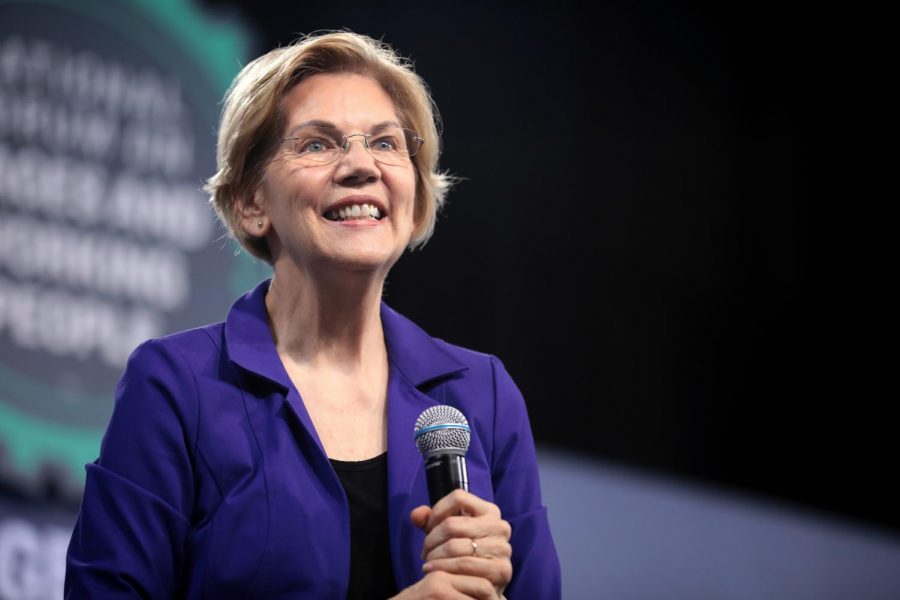Political Science Professors Comment on Elizabeth Warren’s Run for Office
On Thursday, March 5, Sen. Elizabeth Warren made the decision to drop out of the Democratic primary.
On Thursday, March 5, Sen. Elizabeth Warren made the decision to drop out of the Democratic presidential primary.
As she announced her exit, Warren tried to maintain a sense of positivity and hope.
“Our work continues, the fight goes on, and big dreams never die. From the bottom of my heart, thank you,” she tweeted.
Her exit from the race came after a disappointing performance on Super Tuesday. Warren had not won a presidential state primary and did not place higher than third in a single state, including her own home state of Massachusetts, according to Politico.
“Warren’s chances for winning the nomination were essentially zero after Super Tuesday,” said Boris Heersink, a professor of political science at Fordham University. “For her to actually win a majority of delegates she would have needed to win over 70% of the remaining delegates, which given her performance up until then, was almost unthinkable.”
Professor Monika McDermott, also a professor in the political science department, agreed.
“I think Warren hung on as long as she could in the face of continued failures to grab a core share of the Democratic primary electorate in the early states,” said McDermott. “Her campaign clearly thought she would breakthrough, but she never did
Though Warren was initially fairly popular, her support dwindled as voters began actually heading to the polls, according to an analysis by the Washington Post. Some of her supporters believe voters largely rejected her because of her gender, arguing America is still not ready for a woman in the White House, according to an article by The Nation.
However, McDermott said she thinks it is difficult to prove this was actually a major factor in the decline of her popularity.
“It is impossible to tell what effect her gender had,” she said. “After all, Clinton was able to gain the nomination in 2016 (and subsequently win the popular vote), so it can’t be that it’s impossible for a woman to successfully compete for the presidency. I think her campaign, as with all the others, had its own ups and downs due to voters’ attention levels and preferences.”
Even as Warren exits the race, many Americans, especially those who comprised her devoted base, still expect her to have an active voice during the rest of the primary season. There is precedent for Warren to make an endorsement, as both Senator Amy Klobuchar and former South Bend Mayor Pete Buttigieg endorsed former Vice President Joe Biden within days of leaving the race at the beginning of March, according to NPR.
Beto O’Rourke and Senators Cory Booker and Kamala Harris have also all chosen to endorse Biden. In a tweet on Sunday, March 8, Harris promised to “do everything in (her) power to help elect him.” This came as a surprise to some, as Harris previously attacked Biden on the debate stage for not supporting federal desegregation of schools when he was a U.S. senator during the 1970s.
However, Warren seems to be uninterested in making an endorsement just yet. During her first appearance with the press after she left the race, Warren said she was not ready to make an official endorsement, according to The New York Times. And after an appearance on SNL, in which Warren made a joke about endorsing both Sen. Bernie Sanders and Joe Biden, it seems unlikely that she will make a decision in the coming days.
“I don’t think she’ll endorse anyone until after the convention like in 2016,” said Jack McClatchy, FCRH ’21, co-chair of the new Fordham chapter of the Young Democratic Socialists of America (YSDA). “Any hope for a Sanders nomination died with her SNL and MSNBC appearances where she signaled disdain for Sanders supporters online. It’d be unfathomable for her to endorse Joe Biden when she entered politics to fight his bankruptcy bill.”
Heersink said he was skeptical of Warren’s endorsement carrying any weight in voters’ decision in remaining elections.
“I doubt her supporters will blindly follow whoever she endorses,” said Heersink. “Based on polls it seems like roughly 60% of Warren supporters prefer Sanders as a second choice and 40% prefer Biden. I’m not sure how much her endorsement would switch people in either direction.”
“At the end of the day, I think Warren voters who were ideologically supportive of Warren will vote Sanders and those who were there for the optics will go for Biden,” said McClatchy.
McDermott said she agreed that her base would likely splinter, even if Warren chose to make an official endorsement.

Abbey Delk is a junior from Wheeling, West Virginia, double majoring in English and journalism and minoring in film & television. Her career at the...







































































































































































































